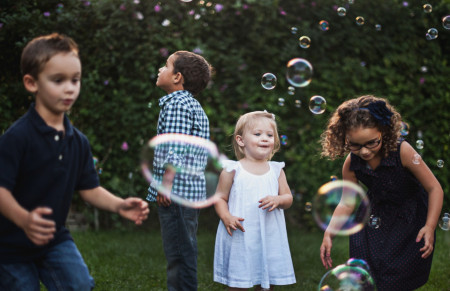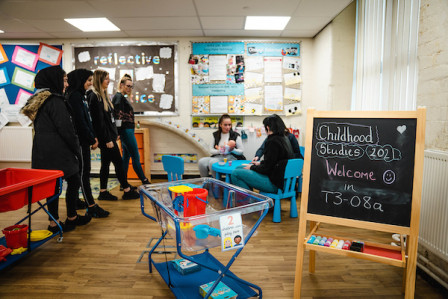
University of Bolton, Deane Road, Bolton. BL3 5AB
Tel:
Email:


“At the University of Bolton, we take great pride in providing a quality, supportive learning environment for our students.”
Professor George E Holmes DL | President & Vice Chancellor
“...tutors are very supportive and you’re not just a student ID number, at this university you are an individual with a name.”
Ellisse Vernon | BSc (Hons) Adult Nursing
Back to menu
Back to menu
Study with an Off-Campus Partner
Back to menu
Back to menu
University of Bolton, why we are the right choice
Location - Bolton, Greater Manchester

02/08/2022
Have you ever considered an early year's childhood studies degree?
Children’s early years are defined as the period from pre-birth to starting school, and this is a vital time in any child’s development as this is where they develop important bonds, language skills, and other cognitive and behavioural functions. These functions are developed in a child’s developmental milestones. These are the specific actions that children can learn to do by a certain age. However, it’s important to note that although children often develop these milestones in the same order, the timeframes they learn them in are different as ultimately, every brain develops differently. As a graduate entering the early year's sector, you will benefit from a hands-on career playing an impactful role in children’s development leading up to when they start primary school at age 4. Whether you’re interested in becoming a nursery worker, an education consultant, a play therapist, a learning mentor, or a family support worker, for example, you will be entering a career and be able to build positive habits and traits in a child's behaviour.
Let’s talk about some of the developmental milestones that children hit during the first few years of their lives, as well as the impact you can have on their lives as a graduate with an early year's childhood studies degree.

When a New Life is Born
The period of babies being 0-18 months is the time people get caught up with how small, cute, and happy the baby is; however, this is a time when they grow and change a lot. How cute is hearing a baby’s first word? Children can reach this developmental milestone at 5-9 months when they learn to respond to hearing their name. Another big moment in the early years of a child’s life is taking their first step. From potentially being able to roll over at 4-6 months, to crawling at 9-12 months, children often learn to stand on their own or walk while holding onto surfaces at 12-18 months.
Developmental Milestones: 18 Months to 2 Years
Regular nap times are pivotal to any child’s development. Parents and doctors stress the importance of keeping their children in a secure routine, as it’s a well-grounded way of ensuring that they are getting everything they need. But what developmental milestones do children hit by the time they are 2 years old?
- Scribbling, and grouping colours and shapes together – How challenging can it be trying to have eyes in the back of your head by trying to stop children scribbling on different objects in the home?
- Enjoying play dates – Allowing children to build good social relationships is also a good developmental milestone because it helps with their progression and stops them from becoming isolated
Other milestones at this stage include being able to follow and defy simple instructions like ‘please stand up’ or ‘come back here’. Being about to ask simple questions or name things is also a significant one, and being able to start to run, jump up and down, and potentially learn to climb stairs while holding onto a handrail.

Get Ready for Primary School!
Children aged between 3 and 5; what developmental milestones do they hit? Some, from a cognitive perspective, learning to count, turning book pages, naming some colours and capital letters, and drawing stick figures. From a social and emotional perspective, children can start to learn to show empathy for hurt or crying children and offer affection, understand what ‘mine’ and ‘yours’ is, begin to play with others, and talk about their likes and dislikes. Children can start to talk using 2-3 sentences at a time, recognise and recite nursery rhymes, and ask simple questions about stories. Finally, children are playful humans. An early year’s childhood studies job will require a vast amount of social interaction with the children in an enjoyable and friendly, yet professional manner.
Are you a socially active individual who would love to work around children? An early year’s degree could be a great career investment.
How do Early Years Graduates Improve Child Outcomes?
We’ve listed the developmental milestones that children go through, as well as when they might develop them. But you might be wondering how early years degree graduates can genuinely help improve child outcomes. Firstly, the first few years of a child’s life are when their brains are like sponges, as they absorb everything around them. Therefore, as an early year's graduate, you can take the opportunity to become a role model for children in terms of teaching them how to interact with others, regulate their emotions, and begin to think critically. Let’s explore some key benefits of early years education.
- Increased learning opportunities - In your early year's childhood studies job, you will demonstrate different instruction techniques to the children, therefore exposing them to more opportunities for learning and allowing them to learn at their own pace. This is essential for expanding their brain development as children are explorative individuals, so they need this to start expanding their intellectual capacity in preparation for starting primary school
- Encouraging positive habits – Due to children’s good history of absorbing information from an early age, early years education can also be a good opportunity to build goods habits in them. This is because as an early year's graduate or experienced professional, you children will look towards you as a role model, so you can use this power to demonstrate different form of manners that they can learn and take with them as they grow and develop into future adults
- Improving their decision-making skills – Early years education gives you the opportunity to teach children the art of making better decisions from an early age. This is because for example, by presenting them with a dilemma and asking them to choose the best solution, you are encouraging them to begin developing their critical thinking skills. Something which is vital when entering any industry when you reach adulthood due to the importance of being able to find solutions and look at situations from multiple different angles
Early years education has received UK government approval, due to a report which found that the positive association between a child attending early years settings with a graduate is twice as strong for those children who spend more time in those settings. Thereby, strengthening the case for the extension of the government’s 30 hours free childcare scheme, making it accessible to all families.

An Early Years Degree at the University of Bolton
Do you love helping children?
At the University of Bolton, we understand that the nature of this industry is practical. Therefore, our early years childhood studies degree combines theory and practice to give our students the industry-relevant skills they need to apply in real-life situations. We offer our students this through beneficial placement opportunities that are facilitated by our strong industry connections. Ultimately, our aim for our early years’ degree students by the time they graduate with us is to use our positive, supportive learning environment to create practitioners that have the knowledge and skills to work across various professions in their future early years’ childhood studies jobs. Putting our students and their needs first is #UniAsItShouldBe and this is how we have been voted 1st for Student Satisfaction for the past five years*. Whether our students are looking to become a nursery worker, early years or primary school teacher, a teaching assistant, an education consultant, youth, or social worker, or many more, we have excellent facilities available on-campus to support them every step of their educational journey and help them pursue their dream. With more one-to-one lecturer support than other universities due to our smaller class sizes, we are here to help.
Does a BA (Hons) Early Years Childhood Studies degree sound like the right career path for you? Head to our website and look at our course details.
Apply Through Clearing 2022
Want to secure a place at a leading Greater Manchester university for Student Satisfaction? Clearing 2022 is available until 19 September. Want to find out more about Clearing? Give us a call on 01204 903030.
Study Advice Sessions
Bolton could be the perfect place to call your home away from home. Register for one of our Study Advice Sessions, where we give you the chance to get a first-hand look around our positive and friendly campus so you can get a feel for the place. With access to our team representatives from careers, courses, student finance, student services, and disability services, we can answer any questions you may have.
Do you want to find out more? Booking is essential to secure your place.
Whether you want to talk to a student, or lecturer, register for one of our Study Advice Sessions, read our blogs, download a brochure, or view our clearing courses, you can do so with a simple click!
- Friday 19 August – 11am to 4pm
- Saturday 20 August – 11am to 4pm
- Thursday 1 September – 11am to 4pm
*Complete University Guide - 2023, 2022, 2021, 2020, 2019 - Northwest